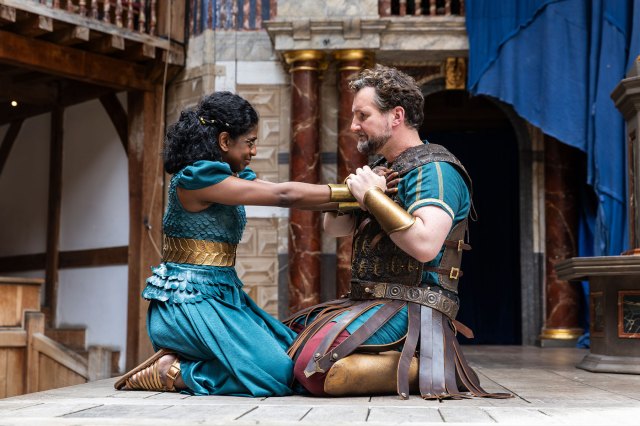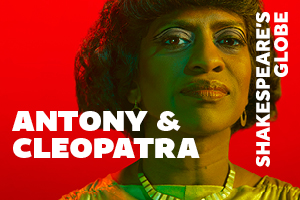Antony and Cleopatra at Shakespeare’s Globe – review
Blanche McIntyre and Charlotte Arrowsmith’s production runs until 15 September

Antony and Cleopatra is a play of coming togethers and clashings – not just between its lovers but between their cultures, too. Marc Antony’s macho, head-first Rome meets Cleopatra’s sensual, matriarchal Egypt, and so begins the tangle of infatuation, distrust and miscommunication that blows the couple’s lives (and countries) apart.
What better way, then, to double down on this culture clash than to give each country its own language? In director Blanche McIntyre and associate director Charlotte Arrowsmith’s production, the cast includes both Deaf and hearing actors, the Romans communicate in spoken English, the Egyptians in British Sign Language (BSL), and screens caption everything. The results are fascinating, if not always successful.
Starting with the successses, the greatest is that the cast’s signing powerfully brings to life Shakespeare’s imagery. We see his poetry in every thrust of an arm or curl of a hand. His wit, too; BSL draws out the play’s humour beautifully, as signing melds into physical comedy. Nadeem Islam is the standout comedian as the wretched messenger who must tell Cleopatra about Antony’s marriage to Octavia, and signs increasingly unflattering and vivid (not to mention scatological) descriptions of the queen’s romantic rival.
The only drawback to the play’s early comedic thrust is that it left some audience members struggling to take its tragic denouement seriously; there were giggles during both of the leads’ deaths.
But the bilingualism is about more than just laughs. The way the languages and captions are used – mixed, withheld, chosen above one another – becomes symbolic of many things. Of diplomacy, when Roman envoys deliver messages to Cleopatra in BSL seemingly learned by rote. Of pain, when Cleopatra (played by Deaf actor Nadia Nadarajah) uses her voice alone to mourn Antony’s passing, the captions shimmering red. Of death itself, when the captions of fallen characters dissolve into dust that floats offscreen. And of love, when Antony interprets for Cleopatra or when, surrounded by Romans, the pair switch to BSL and retreat into their own communicative cocoon.
The bilingual bond between our tragic pair is certainly convincing, but it sometimes feels too grown-up and tender. To understand Antony’s disastrous military decisions, we need the extravagant intoxication of Shakespeare’s text – to feel like the pair are in a lustful fever dream, rather than a sweet, sensible romance.
By the same token, John Hollingworth’s Antony seems a touch too level-headed. Although his commanding physicality and charisma still make him a compelling watch. Nadarajah’s Cleopatra meanwhile is a pint-sized powerhouse. Mercurial and witty, as all good Cleopatras are, but also charming, fierce, and at times delightfully petulant.
The rest of the cast are roundly superb, wringing nuance from the text in both their English and BSL interpretations. Daniel Millar in particular, as Enobarbus, is one of those rare actors who makes the most complex Shakespearean feel like lines from a punchy sitcom.
The play’s 42 scenes, which roll into one another, can trip directors up but McIntyre and Arrowsmith keep a steady rhythm. And the constant continent switching is made blessedly clear by Simon Daw’s simple design and Natalia Alvarez’s colour-coded costumes.
As a hearing person, I was conscious of missing the powerful BSL performances happening onstage while I read the captions. However, I imagine my frustration was shared by Deaf audience members during the spoken English sections, which must be a far more regular occurrence in the theatre.
Ultimately, as people both clapped and waved their hands in the air at the curtain call, it became clear that this production is a cultural coming together all of its own. One that levels theatregoers’ experiences and unites them in their shared love of a story.



















